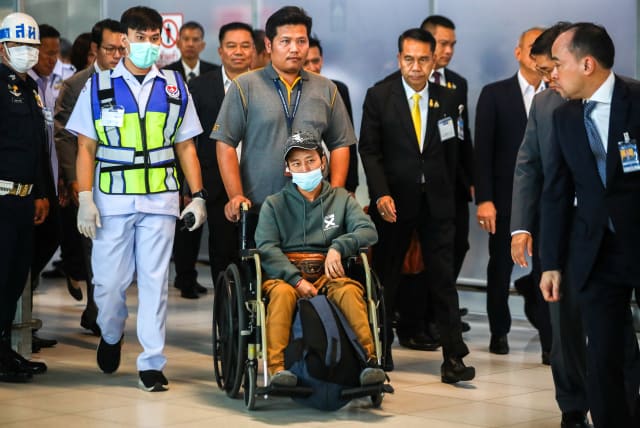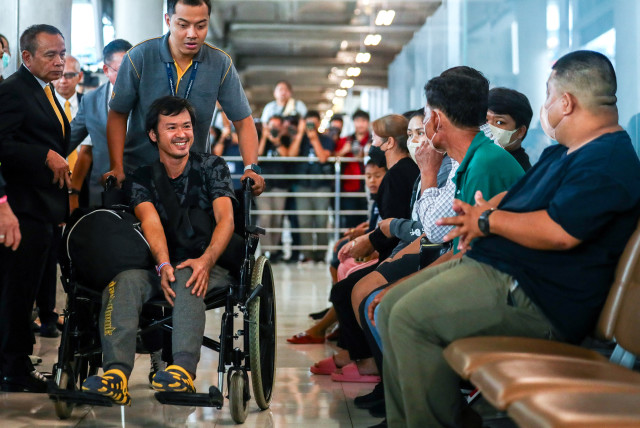Repatriating the Thais - interview with the ambassador of Thailand

Thais were among the casualties of Hamas's murderous incursion into kibbutzim and moshavim located in the Gaza envelope.
It is rare to see Thailand's ambassador Pannabha Chandraramya in a somber mood. She is by nature a happy-go-lucky people-person who can usually be seen in animated conversation or exchanging air kisses with friends and colleagues.
But Chandraramya, who was due to wind up her term after four years in Israel, got caught up in a war, and subsequently in the repatriation process of literally thousands of her countrymen.
She looked exhausted on Tuesday when interviewed by The Jerusalem Post at the David Intercontinental Hotel in Tel Aviv to where she has temporarily transferred her embassy.
In the basement area of the hotel, in the huge lobby leading to the ballroom, scores of Thais waited quietly and patiently to be processed. One floor up, at the rear entrance to the hotel, were endless groups of Thais arriving to join those who were already there.
Most came with luggage, inadvertently promoting the idea that the trolley case was one of the best inventions of the twentieth century. Had the cases been without wheels, there would have been bedlam, considering the number of people involved.
Ambassador Chandraramya has never previously served in a country at war. But she's not afraid. "I've been here long enough to know how things tick," she said, but admitted that her mother and sister are very fearful for her. "I have to contact them every day to let them know that I'm still alive."
The total Thai population in Israel at peak numbers is around 30,000. Of these, some 28,000 come to Israel to work in agricultural sector all over the countries. There are also approximately 120 students under the auspices of Mashav, the Foreign Ministry's Agency for International Development Cooperation and work on farms in an earn-as-you-learn project which is a win-win situation for both the farmer and the Thai worker. The farmer gets workers whom he trains himself and whose salary is relatively low, and the Thai workers gain hands-on expertise in different agricultural disciplines, so that when they go home, they can start setting up farms of their own or find good jobs on existing ones.
Approximately 2,000 of the Thais living in Israel are either married to Israelis or working in service industries. There are no Thai university students in Israel, and very few Thai women. At best, said the ambassador, women comprise 5% of the Israeli Thai population.
Thais were among the casualties of Hamas's murderous incursion into kibbutzim and moshavim located in the Gaza envelope.
Although the numbers keep changing as new information is revealed, on Tuesday thirty Thais were reportedly among the murdered and missing. The Israeli authorities had at that stage confirmed that 15 were murdered. Some of these victims have already been transferred to Thailand for burial.
The fate of the other 15 remains unknown.
19 were kidnapped by Hamas and 18 were injured
The Thai government immediately set the wheels in motion for moving Thai citizens to safer areas and organizing their repatriation.
By Tuesday of this week, 8,000 Thais had registered to go home, and 3,600 had already been repatriated - mostly in 18 charter planes.
In the beginning, there were no charter flights; now there are two every day.
Workers who have registered to return to Thailand are processed at the rate of 300-500 per day, said Chandraramya.
Some of the stories they tell of what they endured while trying to evade Hamas, and desperately finding where to hide, have made her weep.
The sheer volume was the reason for the temporary transfer of the embassy. There simply wasn't enough room to find place for all the people who came to be processed, to supply them with accommodation while they waited for their flight, and to deal with other relevant issues. In addition, the embassy is located in Herzliya Pituah, and it was much easier for people not familiar with Israeli geography to get to Tel Aviv.
Although the embassy has a very professional and dedicated team, it was not equipped to handle such an additional load of work. The Thai Foreign Ministry sent additional human resources to help, and the Thai government pays for the cost of the planes, for food and for hotel accommodation, which is for either one or two nights per person waiting to board a flight.
The ambassador barely manages to get three hours of sleep each night.
There's a daily briefing every morning with the deputy prime foreign minister. The briefing is held at Thai time which is four hours ahead of Israel, so Chandraramya has to get out of bed before dawn. Two of these briefings have been conducted by the prime minister.
The royal family is also worried about the Thai hostages. The ambassador has a colleague at the palace who notifies her of their concern and their desire to be informed of developments.
Thailand is using all the resources at its disposal to secure the release of its citizens
In January 2012, the Kingdom of Thailand recognized the State of Palestine, and the two have diplomatic relations. The Thai ambassador in Amman is also accredited to Palestine. Thailand's Ministry of Foreign Affairs is using all the means at its disposal to secure the release of Thai citizens from Hamas captivity, and is also pursuing its Palestinian diplomatic channels, though Chandraramya is not involved in that.
Among the staff in her embassy is someone who deals with labor issues, and who is making sure that all Thai workers know their rights, and are paid their salaries up until the last day on which they worked. Some employers are holding back, and the embassy is attempting to resolve this matter. Money owed to workers will be forwarded to them at their homes in Thailand.
Most of the workers who have registered for repatriation have said that they want to come back to Israel after the war is over. Those staying in the country are either doing so because they are in relatively safe places or because their employers have offered them more money.
Farmers who are presently short-staffed for picking and packing crops have been inundated with volunteers whom they have regretfully turned away, because there is no time to train them, and workers lacking in experience are worse than a lack of workers.
Chandraramya has set up a crisis unit within the embassy to deal with the unexpected. No matter how many similar situations there might be, there is almost always something that no-one previously conceived.
The ambassador has no idea how much longer she will remain in Israel. Speaking for all the embassy staff, who she said, "are amazing," she stated: "Our aim is to ensure the safety of the Thai people. We are staying because we don't know how long the war will go on. If the situation gets worse, I will be the last to leave."
Jerusalem Post Store
`; document.getElementById("linkPremium").innerHTML = cont; var divWithLink = document.getElementById("premium-link"); if (divWithLink !== null && divWithLink !== 'undefined') { divWithLink.style.border = "solid 1px #cb0f3e"; divWithLink.style.textAlign = "center"; divWithLink.style.marginBottom = "15px"; divWithLink.style.marginTop = "15px"; divWithLink.style.width = "100%"; divWithLink.style.backgroundColor = "#122952"; divWithLink.style.color = "#ffffff"; divWithLink.style.lineHeight = "1.5"; } } (function (v, i) { });

